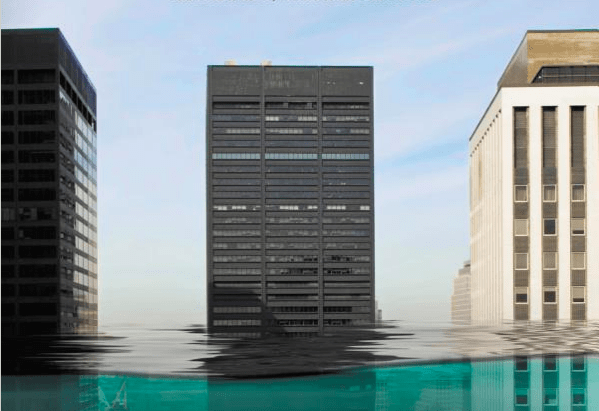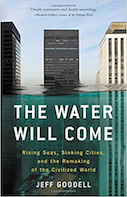The Water Will Come
Jeff Goodell's cautionary book on sea level rise and climate change offers a modern history of arrogance in the face of evidence. Hachette Book Group
Hachette Book Group
“The Water Will Come: Rising Seas, Sinking Cities, and the Remaking of the Civilized World”
Purchase in the Truthdig Bazaar
A book by Jeff Goodell
Like a cosmic ba-da-bing, Jeff Goodell’s “The Water Will Come: Rising Seas, Sinking Cities, and the Remaking of the Civilized World” was delivered to my doorstep as Hurricane Irma whipped its way toward Florida. The second Category 4 hurricane to hit the States in under three weeks, Irma would not be the last to pummel our shores, level communities and cause billions in damage this fall. Harvey preceded it, killed 82 people, and spewed a secondary storm of industrial toxins into the Houston ecosystem. Maria followed Irma, and destroyed pretty much all of Puerto Rico’s infrastructure, on top of ending over 400 lives and upending everyone else’s. September’s mighty weather underlines the urgency of the wealth of knowledge Goodell has assembled here.
This is Goodell’s third volume on climate related issues; previous books include one on geoengineering and another on coal. As one of the few American journalists with a decade-long beat devoted to the environment and climate change, the Rolling Stone columnist is well-suited to flesh out this part of the global warning saga. He began reporting on the increasing rate and risk of sea level rise in a 2013 investigative piece focused on South Florida.
Click here to read long excerpts from “The Water Will Rise” at Google Books.
The prologue of his new book, as well as other segments in it, comes from that Rolling Stone story, the origin of this wider study. Realizing the number of cities and towns already suffering effects and expecting a far more dismal future, Goodell foresaw sea level rise as a major climate stress point, both in terms of magnitude and the ongoing denial of the danger and damage ahead. Also expanded from the 2013 article are discussions of two stupefying models of bad planning that are exacerbated by rising sea levels: the Turkey Point nuclear power plant and the National Flood Insurance Program.
Organized mostly by location, “The Water Will Come” brims with designers, engineers and scientists, their studies and data, statistical synthesis and long-range modeled projections—a new reference guide of mostly inconvenient truths. But it also overflows with politics, deal-making and procrastination, and seems like a modern history of arrogance in the face of evidence.
Early on, Goodell reminds readers that sea level has always fluctuated. Global warming, however, has caused the massive melting of ice sheets, feedback loops and an increasing rate of sea level rise, which makes it a planetary peril. Geography and geology also determine the severity of the crisis, and no two places face the same threat level.
This accessible book sometimes feels like a travelogue of looming disaster zones, starting in Miami Beach, Florida, to places most endangered by the inundation of salt water—Venice, Nigeria, the Marshall Islands, Alaska and New York. A compendium of proposed and in-progress responses is included. All these deluge prone low-lying regions flood much more often now. In the 1940s, for instance, Venice flooded about 10 times a year; now it happens 75 times yearly.
The fact that Venice’s Malibran Opera House perches atop five structures-as-solutions to flooding, with Marco Polo’s house on the bottom, makes for Ripley-esque reading, as does the recounting of how Florida’s sandy beaches didn’t even exist until the late 1800s. They were dredged out of the sea, and impenetrable jungles filled with rodents and insects were hacked down to make way for real estate speculation and “vacation ideology.” Concise lessons in geology illuminate changing physical realities, for those whose earth sciences background is minimal or rusty. Terms like ooid, riprap and moulin are defined in context (respectively: smaller-than-sand porous limestone pearls on which much of South Florida is built (!); fortified granite used to build protective sea walls on the Marshall Islands; and holes in the ice where rivers waterfall into glacier interiors.) Goodell explains a fascinating nonintuitive paradox called fingerprinting—melting ice from Antarctica most affects the northern latitudes, while Greenland melt has a bigger impact on the southern latitudes. This occurs because of the way gravity spreads water as the Earth turns.
And ice is melting faster than climate models predicted, so it’s likely there is a factor or factors that are unaccounted for. Climatologist Jason Box’s “united theory of glaciology” intrigues and agitates: He poses that the soot from fossil fuel burning is darkening the ice and a strong, overlooked cause behind rapid ice melt. Box is known for his outlier prediction that the Petermann Glacier would break apart in the summer of 2009. (The breakup began in 2010, and it was “shedding icebergs twice the size of Manhattan” by 2012, now called The Great Melt.)
Such unnerving news is pervasive, and Goodell writes with a gentle tone for so worrying a subject. Yet he states his cases convincingly. And while his clarity and organizational abilities supersede style, his concern for the poetic losses we’ll also suffer in our abandonment of good sense is evident, as when he discusses the work of Florida artists Michele Oka Doner and Xavier Cortada. What came up for me throughout was: Is it the complexity of these problems that fosters avoidance, or that our species just loves a tense game of Risk when it comes to money? Perhaps both. Or maybe it’s not so complex. As Box told Goodell, “I like ice because it’s nature’s thermometer. … It’s simple. It’s the kind of science that everyone can understand.” One would think.
But if wealth protection—and political expediency to that end, which creates economic feedback loops—are not behind denial and poor planning, faith in technology emerges throughout the book as the go-to public prayer. Politicians, investors and bureaucrats are almost religious in their belief that something will shift, some innovation will happen, the Dutch will lead the way, or another variation on the hope-and-pray theme. I was struck by Goodell’s interview with Obama, also covered in a 2015 Goodell/Rolling Stone column and short film. Is it notable and laudable that an American president finally went to the Arctic? Yes. But Obama was tepid about climate change until the end of his second term. And he, too, offered bromides about the human imagination, despite sharing his worries about his kids’ future. His kids will indeed face the consequences of too little action, taken too late. As will all of the elected leaders’ and real estate moguls’ kids. (What about all of those kids? If those with power can’t put their own progeny before markets and magical thinking, we are really in trouble.) We are really in trouble.
As Goodell points out repeatedly, issues like exorbitant expense, production lead times for big engineering projects, and unexpected speedups in glacial melt do not make innovation-as-savior likely. What’s more, failures of existing technology come in all forms, and unintended consequences may be the worst kind for climate change related problems that will put so many lives on the line. Goodell cautions that technology can “enfeeble” us as much as it helps us. In Nigeria and elsewhere in the third world, the people are not counting on technology. They adapt to rising water or move to higher ground, sometimes with little notice and/or by cruel government force. (“The Water Will Come” is also a story of entrenched inequality, here and around the world.)
This is a book loaded with valuable information, and will be remembered as both a warning and reference volume. And Goodell acknowledges gratitude that Rolling Stone and his publisher believe in climate change journalism. But there was no discussion of the shortage of day-to-day environmental reporting that is broadcast or published in mainstream outlets. This shortage may be a key to why and how elected officials are able to get away with either ignoring the problem or promoting short-term solutions to the flooding, despite all the crises to which the public will be vulnerable in the near future because of rapidly rising seas.
In a March 2017 report, Media Matters noted:
In 2016, evening newscasts and Sunday shows on ABC, CBS, and NBC, as well as Fox Broadcast Co.’s Fox News Sunday, collectively decreased their total coverage of climate change by 66 percent compared to 2015, even though there were a host of important climate-related stories, including the announcement of 2015 as the hottest year on record, the signing of the Paris climate agreement, and numerous climate-related extreme weather events.
Knowledge has been on trial for a while now, with the spread of unreasonable doubt its greatest adversary. But the recent media shift regarding another under-reported story, sexual harassment and assault by the powerful, could be a nudge to publishers, editors and other media gatekeepers who have been constrained by fossil fuel politics and advertising money. If journalists can break through the Murdoch/Ailes wall of silence on that long-hidden issue—which led the way to the comeuppance of O’Reilly, Weinstein, et al.—they can do the same for the public on climate change and sea level rise.
Reporting in Rotterdam, one of the few places fractionally prepared for sea level rise, Goodell spoke with the Dutch special envoy for international water affairs, Henk Ovink. After talking about the 1966 Venice flood, similar in catastrophic wallop to the great storm of 1953 that caused a 20 foot surge and killed 20,000 people, Ovink said, “It was the moment we realized we weren’t safe anymore.” There are many tragedies that will come with the rising water, including food and freshwater shortages, the spread of illness, loss of homes and habitants. When will our moment of realization arrive? The water is already coming.
Your support matters…Independent journalism is under threat and overshadowed by heavily funded mainstream media.
You can help level the playing field. Become a member.
Your tax-deductible contribution keeps us digging beneath the headlines to give you thought-provoking, investigative reporting and analysis that unearths what's really happening- without compromise.
Give today to support our courageous, independent journalists.







You need to be a supporter to comment.
There are currently no responses to this article.
Be the first to respond.